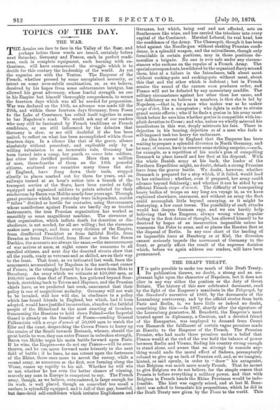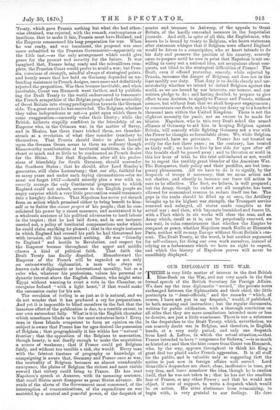THE DRAFT TREATY. Treaty, which gave Prussia nothing but what
she had other- wise obtained, was rejected, with the remark, contemptuous or insidious, that to make it fair, Prussia must have Holland, and the Emperor commenced his long preparation for war. When he was ready, and war imminent, the proposal was once more submitted to the Prussian Government--apparently on the 15th inst.—as the only arrangement which could give peace for the present and security for the future. It was imagined that, France being ready and the mitrailleurs com- plete, the Prussian Court would prefer to avoid a war; but Prus- sia, conscious of strength, mindful always of strategical points, and keenly aware that her hold on Germany depended on un- bending resistance to French designs, once more and definitively rejected the proposition. War then became inevitable, and when inevitable, Count von Bismarck went farther, and by publish- ing the Draft Treaty to the world endeavoured to transmute the French sympathies of the Belgian people and the neutrality of Great Britain into strong predisposition towards the German side. To a great extent he has succeeded. The Belgians, whether they value independence or not—a point upon which there is some exaggeration—earnestly value their liberty ; while the British, hitherto stupidly confident in the friendship of an Emperor who, in the Crimean war, in the matter of Savoy, and in Mexico, has three times tricked them, are thunder- struck at a revelation of what they consider treachery to themselves. That Prussia should desire to plant herself upon the German Ocean seems to them an ordinary though blameworthy manifestation of territorial ambition, in the ab- stract as much and as little to be condemned as French desire
for the Rhine. But that Napoleon, after all his profes- sions of friendship for South Germany, should surrender the Southern States ; that he should, after Lord Stanley's guarantee, still claim Luxemburg ; that our ally, faithful for so many years and under such trying circumstances—for we must not forget 1857—should secretly plan a war with us, secretly arrange the only Continental programme to which England could not submit, arouses in the English people an angry surprise which a very little provocation would transmute into a haughty defiance. That Napoleon has never yet shrunk from an action which promised either to bring benefit to him- self or to flatter the amour propre of his people ; that he con- solidated his power by a street massacre, and maintained it by a wholesale sentence of his political adversaries to hard labour in the tropics ; that he had laid down, and in one instance -carried out, a policy of territorial compensations under which the could claim anything he pleased ; that in the single instance in which England had crossed his path he had threatened her with invasion, all this mattered nothing. He was "friendly to England " and hostile to Revolution, and respect for the Emperor became throughout the upper and middle .classes a kind of political faith. That faith the
Draft Treaty has finally dispelled. Henceforward the Emperor of the French will be regarded as not only an untrustworthy diplomatist, a man who obeys no .known code of diplomatic or international morality, but as a ruler who, whatever his professions, values his personal or dynastic interest above the English alliance, who might seize Egypt without warning to avert a vote in the Chamber, or recognize Ireland " with a light heart," if that would make the succession easier for his son.
The revulsion of feeling is as just as it is natural, and we do not wonder that it has produced a cry for preparations. And yet it is impossible to blind ourselves to the fact that the immense effect of the publication is due, to a terrible extent, to our own antecedent folly. What is it in the English character which sometimes blinds us to the most notorious facts ? Every man in these Islands competent to form an opinion on the subject is aware that France has for ages desired the possession of Belgium ; that geographically it lies within her " natural " frontier ; that the opposition of the Belgians to annexation, though hearty, is not deadly enough to make the acquisition a source of weakness ; that if France could get Belgium fairly, and without too terrible a risk, she would. Every man with the faintest tincture of geography or knowledge of ,campaigning is aware that, Germany and France once at war, the neutrality of Belgium becomes an almost unendurable annoyance, the plains of Belgium the richest and most visible reward that victory could bring to France. He has read Napoleon's speech at Auxerre, with its menacing sentence, that small States must disappear as great States advance. He reads of the alarm of the Government most concerned, of the interruption of communications, of the expenditure on war materiel by a neutral and peaceful power, of the despatch of
armies and treasure to Antwerp, of the appeals to Great Britain, of the hardly concealed menaces in the Imperialist journals. And still, in spite of all this, the Englishman, who knows he is bound by treaty to Belgium, who hears statesman after statesman whisper that if Belgium were effaced England would be driven to a conscription, who at heart intends to do his duty and preserve the position of his country, scarcely cares to prepare until he sees in print that Napoleon is not un- willing to carry out a national idea, not scrupulous about con- q_aests, not blind to the strategical difficulties of France I The Draft, even if offered yesterday, scarcely, while rejected by Prussia, increases the danger of Belgium, and does not in the least modify our duty. That duty is to decide clearly and un- mistakably whether we intend to defend Belgium against the world, as we are bound by our interests, our honour, and our written pledge to do ; and having decided, to prepare to give effect to our decision, to signify to France and Prussia, without menace, but without fear, that we shall keep our engagements ; to concentrate our fleets, and to bring our Army up to a hundred thousand men within the United Kingdom. There is not the slightest necessity for panic, not an excuse to be made for bluster. Napoleon, who in this very Draft asked the armed alliance of Germany to aid him in keeping Belgium against Britain, will scarcely while fighting Germany ask a war with the Power he thought so formidable alone. We, while Belgium is respected, have no grievance. France has not treated us evilly for the last three years ; on the contrary, has treated us fairly well ; we have to live by her side for ages after all this trouble shall be passed away ; and to threaten or scold in this her hour of trial, be the trial self-induced or not, would be to repeat the terribly great blunder of the American War. The Bonapartes, their policy and their perfidies, are but tem- porary phenomena. All we have to do is to signify, by the despatch of troops if necessary, that we mean action and not chatter, and silently to increase our force till action is sure to be effective. The fleet, we believe, is well prepared ; but the Army, though its cadres are all complete, has been allowed for economical reasons to reduce itself too far. The gaps in the ranks should be filled up at once, the Artillery brought up to its highest war strength, the Transport service renewed and enlarged, all stores made complete as for actual war ; and then, with bayonets burnished and fusees lit, with a Fleet which in six weeks will clear the seas, and an Army which, small as it is, can be perpetually renewed, we can wait, in calm consciousness that whether the Empire be conquest or peace,•whether Napoleon reach Berlin or Bismarck Paris, neither will re-map Europe without Great Britain's con- sent. The Draft Treaty, at the worst, is but another argument for self-reliance, for doing our own work ourselves, instead of relying on a forbearance which we have no right to expect, and which the history of Napoleon proves will never be unselfishly displayed.































 Previous page
Previous page